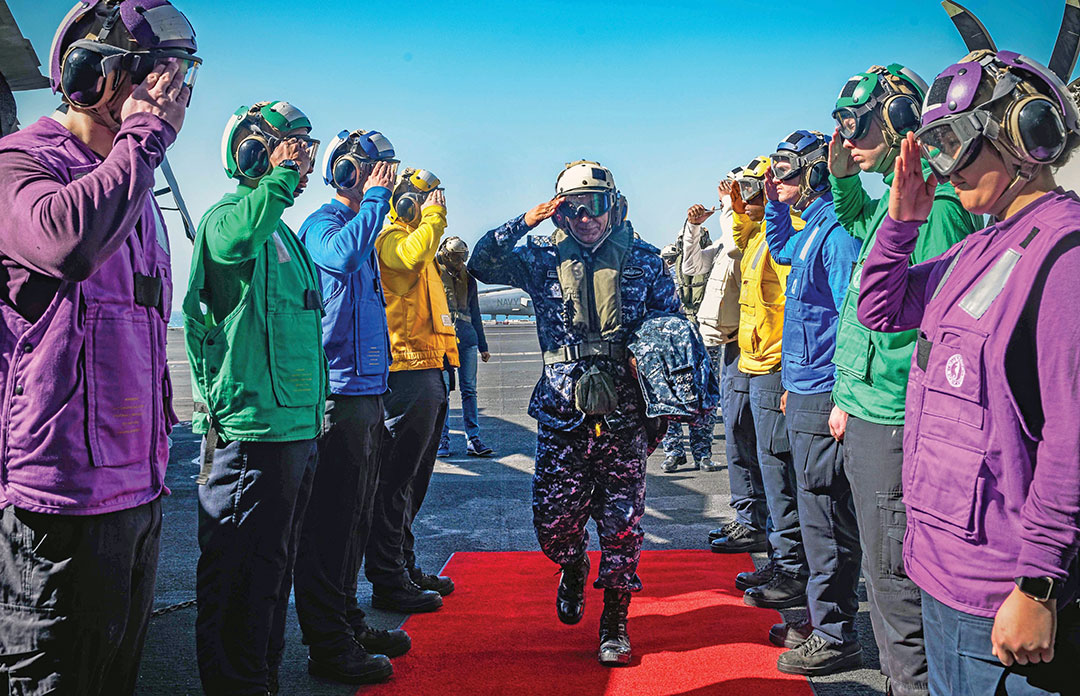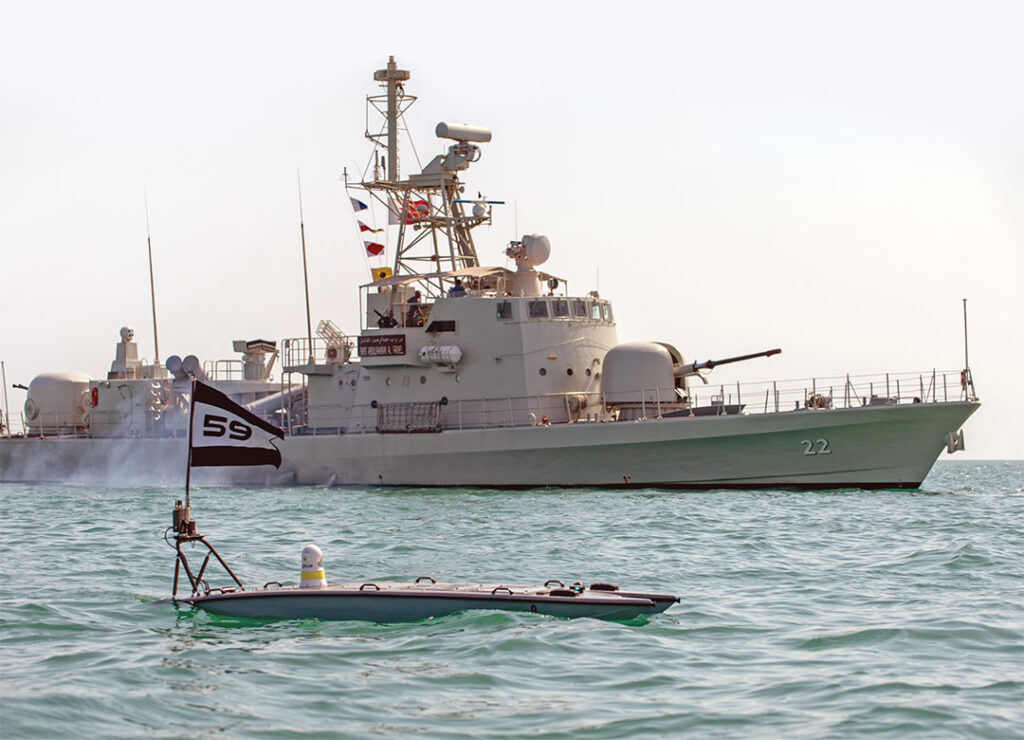Rear Adm. Mohammed Yousif Al Asam joined the Bahrain Defence Force in 1979 as an officer candidate and was sent to the Pakistan Naval Academy in Karachi, where he graduated with honors with a bachelor’s degree in marine science. He progressed through numerous positions aboard naval missile boats as a navigation officer and operations officer until he assumed command of his first ship in 1993 with his appointment to the missile boat al-Jabri.
Further ship commands awaited him — including aboard the frigate Sabha — until he took charge of Bahrain’s Special Naval Group in 2009. Two years later he assumed the post of Head of the Training Division. In 2012 he was appointed Deputy Commander of the Royal Bahrain Naval Force. He rose to the top job — Commander of the Naval Force — in 2017.
Rear Adm. Mohammed has supplemented his hands-on naval experience with coursework at prominent naval academies around the world. The most prominent of these was a course in international communications from the United Kingdom in 1986, a command and staff course from the United Kingdom in 1990, a higher diploma in naval law from Greece in 1997 and a naval warfare course at the U.S. Naval War College in 2008.
His military career is draped in accolades: Bahrain Medal First Class, Bahrain Medal Second Class, Dialogue Medal First Class, Order of Military Merit, Order of Power, Field Service Medal, Order of Gallantry, Order of Competence and the Long Service Medal.
Rear Adm. Mohammed agreed to an interview with Unipath about the role of the Royal Bahrain Naval Force in achieving regional security:

UNIPATH: What are the responsibilities of the Royal Bahrain Naval Force?
Rear Adm. Mohammed: The Royal Bahrain Naval Force’s responsibilities fall within the Bahrain Defence Force system, which was established by His Majesty King Hamad bin Isa Al Khalifa, sovereign of the nation and beloved supreme commander, may God protect him. His Majesty’s strategic insight was that the Kingdom of Bahrain should have a modern naval force to protect the nation’s achievements and the renaissance it witnessed during the second half of the 20th century. The primary mission of the Navy is to defend the kingdom’s territorial and economic waterways, maintain its stability and sovereignty, and combat potential aggression.
UNIPATH: How has the Kingdom of Bahrain begun to modernize its naval forces?
Rear Adm. Mohammed: Our wise leadership is interested in developing the Bahrain Defence Force, of which the Navy is considered a crucial element. It works constantly alongside land and air forces to achieve an interdependent system of defense. Today, in the 21st century, we see that military forces must be formed from a combination of systems — naval vessels, aviation and manpower — to achieve missions entrusted to them. In the maritime field, and based on high-level military strategy, the Royal Bahrain Naval Force has adopted an approach of continuous development to keep up with these challenges. The strategy of modernizing and developing the Royal Bahrain Naval Force is anchored by several main areas, the most important and prominent of which is the human element. The procurement of modern naval vessels and the retrofitting of current ships with the latest systems ensures the Navy keeps pace with modern naval forces in the region. The other modern systems that support naval operations are radar systems, sensors and early warning systems, in addition to unmanned aircraft and boats that save manpower and provide surveillance of the entire naval theater.
UNIPATH: Why does Bahrain host and take part in the Combined Maritime Forces (CMF)?
Rear Adm. Mohammed: The Kingdom of Bahrain’s geography, which is an archipelago of islands in the middle of the Arabian Gulf, and its historical link to the ocean and global trade, has made Bahrain a strategic maritime center in the Middle East, attracting global trade and maritime industries. Since the last century, Bahrain has provided logistical and administrative support for many vessels in the region, and this has made Bahrain a suitable maritime center for allied navies. That is consistent with the Kingdom of Bahrain’s policy of maintaining peace, security and stability in the region to serve economic growth. Since international trade depends primarily on the seas and the oceans — 80% of global trade is maritime — it was only natural that friendly and allied nations have requested the Kingdom of Bahrain be a headquarters for logistics and to provide naval support for these vessels. After the experiences the region has gone through, the whole world realizes nations must unite to protect international shipping lanes and strategic waterways. One country alone cannot secure them without alliances and international cooperation.
UNIPATH: How important is training between the Royal Bahrain Naval Force and the United States Navy?
Rear Adm. Mohammed: Overarching objectives are shared by the Kingdom of Bahrain and the United States of America, which are to maintain regional maritime security and continue the flow of global trade through strategic waterways. The Bahraini and U.S. navies also operate in international waters in joint areas of operation and work closely with each other. Harmony between navies is important, and ongoing training plays a crucial role in standardizing concepts. Today, we are proud that the level of training attained between both navies is highly competent and continuous throughout the year. We have become partners in working to achieve regional maritime security. The Royal Bahrain Naval Force is the main supporter of CMF as host country for the naval coalition, and today we conduct actual operations and are not restricted to only conducting exercises. We have ships at sea that engage in joint patrols with the various operation forces, including Combined Task Force Sentinel, and we support all these commands with manpower, providing officers and Sailors. We are partners in regional maritime security, and the Royal Bahrain Naval Force’s footprint extends from the Arabian Gulf to the Red Sea.

